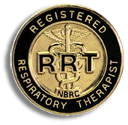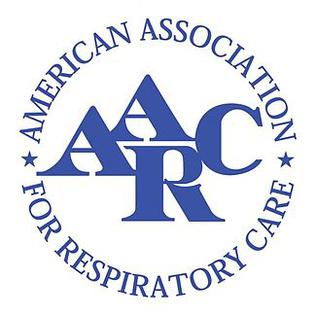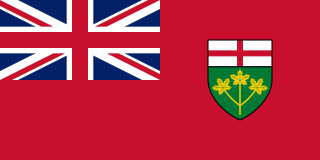
Physical therapy (PT), also known as physiotherapy, is one of the allied health professions that, by using mechanical force and movements, manual therapy, exercise therapy, and electrotherapy, remediates impairments and promotes mobility and function. Physical therapy is used to improve a patient's quality of life through examination, diagnosis, prognosis, physical intervention, and patient education. It is performed by physical therapists.

A respiratory therapist is a specialized healthcare practitioner trained in pulmonary medicine in order to work therapeutically with people suffering from pulmonary disease. Respiratory therapists graduate from a community college or university with a certification in respiratory therapy and have passed a national board certifying examination. The NBRC is the not-for-profit organization responsible for credentionaling the seven areas of Respiratory Therapy.

Pulmonology is a medical speciality that deals with diseases involving the respiratory tract. The term is derived from the Latin word pulmō, pulmōnis ("lung") and the Greek suffix -λογία, -logia. Pulmonology is synonymous with pneumology, respirology and respiratory medicine.
According to the American Therapeutic Recreation Association (ATRA), recreational therapy or therapeutic recreation (TR) is a systematic process that utilizes recreation (leisure) and other activities as interventions to address the assessed needs of individuals with illnesses and/or disabling conditions, as a means to psychological and physical health, recovery and well-being. Recreational therapy may also be simply referred to as recreation therapy, in short it is the utilization and enhancement of leisure.

A registered respiratory therapist (RRT) is a certification for respiratory practitioners. In the United States, the certificate for the RRT is issued by the National Board for Respiratory Care after passing the NBRC-WRE and NBRC-CSE examinations. Eligibility for the NBRC RRT examinations are both previously passing the entry-level examination for the certification of Certified Respiratory Therapist, the NBRC-ELE, and holding at least an Associate of Science in Respiratory Care. In Canada the RRT certification is granted by examination from the Canadian Society of Respiratory Therapists. Internationally, respiratory care is governed by local governments and certification or license to practice as a respiratory practitioner is managed locally without the use of separate organizations as in the United States and Canada.
A Certified Respiratory Therapist (CRT), formerly Certified Respiratory Therapy Technician (CRTT), is a therapist who has graduated from a respiratory therapy program at a university or college and has passed a national certification exam. A CRT or RRT is typically expected to adjust, modify or recommend therapeutic techniques within well-defined procedures based on a limited range of patient responses. In the healthcare setting, usually required supervision by a physician experienced in respiratory care.

The American Association for Respiratory Care (AARC) is a non profit organization and is the only professional organization supporting Respiratory Care in the United States. In addition to attempting to help lobby for beneficial legislation nationally and locally, the AARC is trying to promote the profession as a whole to increase interest and membership. The AARC began in 1943, as the Inhalation Technician Association and has evolved rapidly and repeatedly since.
The National Board for Respiratory Care (NBRC) Inc. is a non-profit organization formed in 1960 with the purpose of awarding and maintaining credentialing for Respiratory Therapists in the United States. The NBRC is the only organization in the United States which develops certification examinations for Registered Respiratory Therapists (RRTs) and Certified Respiratory Therapists (CRTs). The NBRC also offers additional specialization credentialing for respiratory practitioners that hold its certifications. The CRT and RRT designations are the standard credential in respiratory care for licensure requirements in the portions of the United States that have enacted a Respiratory Care Act. States that license respiratory therapists sometimes require the practitioner to maintain their NBRC credentialing to maintain their license to practice. The NBRC is headquartered in Overland Park, Kansas. It has been in the Kansas City metropolitan area since 1974. The NBRC is located at 10801 Mastin St, Suite 300, Overland Park, KS 66210.
The Canadian Society of Respiratory Therapists (CSRT) was founded in 1964 as the Canadian Society of Inhalation Therapy Technicians. Currently it is the Canadian national professional association for respiratory therapists.
A Sleep disorder specialist (SDS) is a Registered Respiratory Therapist (RRT-SDS) that has successfully passed the certification examination NBRC-SDS. The respiratory therapist may also be a Certified Respiratory Therapist (CRT-SDS) under certain conditions. The sleep disorder specialist scores and performs polysomnography and also assists in diagnosing and preparing a treatment plan for the condition. Some of the conditions the sleep disorder specialist helps evaluate and treat are; insomnia, sleep apnea, restless legs syndrome, and narcolepsy.
Healthcare professional credentials are credentials awarded to many healthcare practitioners as a way to standardize the level of education and ability to provide care.

The American Respiratory Care Foundation is a non-profit organization founded by the American Association for Respiratory Care formed to provide funding for research in the field of pulmonology and respiratory care. Formed in 1974 as the American Respiratory Therapy Foundation and then changed to the American Respiratory Care Foundation in 1986. The ARCF is a partner with the United States Environmental Protection Agency, who has awarded grants to the ARCF in order to help fund research directly related to asthma and asthma education.
A College of Respiratory Care is a type of educational institution, or part thereof, providing education and training to become a fully qualified respiratory practitioner. The nature of respiratory care education and respiratory practitioner qualifications varies considerably across the world.
An Associate of Science in Respiratory Care (ASRC) is an entry-level tertiary education respiratory therapy degree. In the United States, this type of degree is usually awarded by community colleges or similar respiratory schools. Some four year colleges also offer this degree. Students in the United States awarded an Associate of Science in Respiratory Care are qualified to sit for the NBRC-ELE and then the NBRC-WRE and NBRC-CSE then apply for state licensure as a Registered Respiratory Therapist.
College of Respiratory Therapists of Ontario (CRTO) regulates the profession of respiratory care by setting out requirements for entry to practice in Ontario, Canada. Authorized by the legislation "Regulated Health Professionals Act" in Ontario, the role of the College of Respiratory Therapists of Ontario is to regulate the practice of respiratory therapy and govern the registered respiratory therapists. Respiratory therapy has been an established health care profession in Canada since 1964.
The Canadian Board for Respiratory Care (CBRC) was founded in 1989 as a non-profit organization which produces examinations for credentialing for practicing respiratory care.
The College and Association of Respiratory Therapists of Alberta is a corporation with delegated provincial government authority to regulate the profession of respiratory therapy pursuant with the Health Professions Act and the Respiratory Therapists Profession Regulation.
Manitoba Association of Registered Respiratory Therapists is Manitoba's professional and licensing body governed by the Respiratory Therapy Act of Manitoba.






